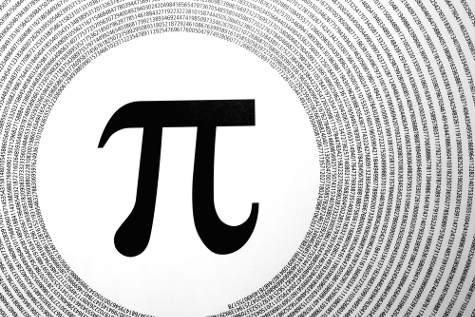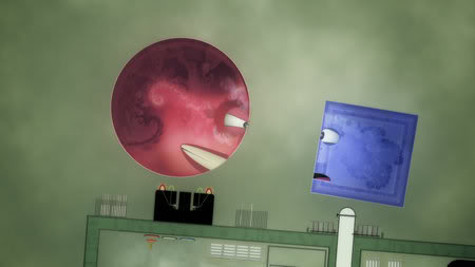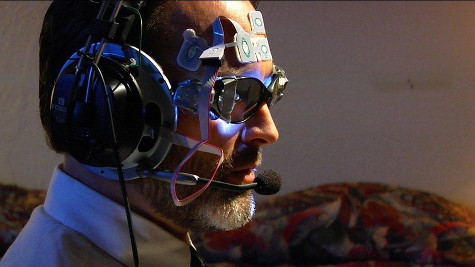
Math and science enthusiasts come together with the mystery/thriller genres to make arithmetic artistry. Following up on a previous post, Movies + Math = A Beautiful Formula, here are five more scintillating titles to add to your viewing list.
PI (1998 film, psychological thriller)

At six years of age, mathematician Maximillian Cohen (Sean Gullette) nearly destroyed his eyesight by staring into the sun. When his vision fully recovered, he found an uncanny gift for numbers and a bolstered belief that there are universal mathematical patterns everywhere in nature—his research specifically targets the stock market.
Because of this Ahabian obsession, Max is a social misfit, ignoring other tenants in his apartment building who try to befriend him. His one true friend is his mentor Sol Robeson (Mark Margolis), who encourages him to take a break before his work consumes him. Max suffers from severe cluster headaches, hallucinations (nothing like finding a pulsating brain on a subway floor to upend your commute), and extreme paranoia. His heightened phobias are not helped by a Wall Street firm surveilling him for his one-of-a-kind data and a Hasidic cabalistic sect that friends him only hoping he will help crack their mathematical dissection of the Torah.
The stark, grainy, black-and-white cinematography enhances the stifling atmosphere as Max descends into madness, representing one of the finest examples of the unreliable narrator since Nabokov’s Despair. In case you are interested in following Max even further down the rabbit hole, here is, courtesy of IMDb, his handwritten 216-digit number:
884509627386359275033751967 943067599621731590401694134 434007629683591574337516791 197615733475195375920401694 343151239621353184932676605 800621596380716399501371459 954387507655892533875618750 354029981152863950711207613.
Flatland: The Movie (2007 animated film, sci-fi)

Flatland: The Movie is based on Flatland: A Romance of Many Dimensions (1884) by Edwin A. Abbott (1838-1926), which is about sentient geometric shapes and sounds like a plot that would have been devised in the 1960s or maybe some hip narrative from Pixar. That this 19th-century satire still has bite is even more remarkable as we follow a world of two-dimensional characters who have a hard time accepting the idea of three-dimensions.
Arthur Square (Martin Sheen) lives with his wife Arlene (Danu Uribe) and their hexagon granddaughter, Hex (Kristen Bell). Ms. Bell, seven years before her Princess Anna performance, is a natural as the inquisitive shape. Remarkable how the filmmakers have taken a century-plus work and modernized it for a new generation. Edge of the proverbial seat suspense, action, and mystery all fused in this pithy, 34-minute film.
The original book was published and disappeared from public consciousness until Albert Einstein’s theories on relativity renewed interest in the fourth dimension. Since then, Flatland has repeatedly popped up in science and pop culture, from professional theoretical physicists Carl Sagan and Stephen Hawking to fictional TV-favorite Sheldon Cooper, who states in “The Psychic Vortex” that Flatland is one of his favorite places to visit, adding, “I am now a hexagon in two-dimensional space and can only perceive the edges of other objects.”
Here’s Carl Sagan (Cosmos) discussing Flatland and The Fourth Dimension:
Touch (TV drama series, 2012-2013)

Touch opens with 11-year-old Jake Bohm (David Mazouz) in voiceover saying, “I was born 4,161 days ago on October 26, 2000. I’ve been alive for eleven years, four months, 21 days, and 14 hours. And in all that time … I’ve never said a single word.” He’s been diagnosed as autistic and spends a majority of his time recording numbers related to patterns into journals. He also causes his widower father Martin (Kiefer Sutherland) a great deal of running around, as Jake abruptly walks out of school to sit dangerously high on cell towers, exits cars to write down numbers seen on the back of buses, etc. He’s attended five schools in seven years.
Martin, at wit’s end, has been hopping from job to job—doorman, taxi driver, construction worker, baggage handler—and now that social services has been called, he’s in danger of losing Jake. What the audience is let in on early, is that all these random figures are tightly interwoven: a man who has lost his phone, a woman who wants to be a singer, and a firefighter who buys lottery tickets and tapes them to his bedroom wall. Eventually forced to have Jake institutionalized, he begins working with Professor Arthur Teller (Danny Glover) to unlock Jake’s focal point in the much larger world.
Fibonacci numbers are everywhere, and here’s mathematician Arthur Benjamin explaining them:
Traveling Salesman (2012 film, intellectual thriller)

A single proof that could unlock the fundamental laws in our universe is known as P versus NP: If the solution to a problem is easy to check for correctness, is the problem easy to solve? Or, as a mathematician known as Number Four (Matt Lagan) says, “P = NP is the most significant problem in theoretical computer science and mathematical complexity theory … we just showed that it’s easy.”
Number Four and three other mathematicians (Eric Bloom, Danny Barclay, Tyler Seiple) have been brought together by the Department of Defense and have now solved the problem. As they wait for their superior to arrive to turn over their final report, they begin discussing (arguing in many cases) among themselves the implications of the discovery and whether they are modern day Oppenheimers about to let an uncontrollable genie out of the bottle. “Financial information, technical information, military data, coded national secrets” can all be compromised.
Conflicts double down when a government official says their info is not to be discussed, that it must be safeguarded for national security, and the mathematicians suspect that they could become possible scapegoats in the future. No. 1 (Danny Barclay) says, “I’m sorry, that’s not we signed up for.” No explosions, car chases, etc., and yet it’s far more entertaining than most thrillers that rely on those bloated tropes.
Coldest, sobering line is when the govie brings them down off their idealistic high horses by saying that they are, “A soldered link in a greater chain reaction.”
Einstein’s God Model (2016, sci-fi film)

A movie that owes more debt to Thomas Edison’s The Spirit Phone (“electric Ouija board”)—which attempted to open a line with the dead—than Einstein. Regardless, the film triumphs a gamut of real science, including string theory, quantum physics, and a host of lesser known metaphysical concepts. In the offbeat opening credits—giving respect where respect is due—Niels Bohr and Nikola Tesla are mentioned.
The premise has Brayden Taylor (Aaron Graham), an anesthesiologist, losing his girlfriend Abby Lucey (Kirby O’Connell) in a freak car accident, and he immediately begins researching online for ways to contact her in the great beyond. This brings him to Louis Mastenbrook, a former assistant to a leading physicist who operated Edison’s original archaic machine, and a cynical, alcoholic, blind medium named Craig Leeham (Brad Norman).
It's an ambitious low-budget film with dialogue that can be a real hoot at times and performances that are across the acting spectrum, but—as more than one reviewer noted—the film succeeds in putting the science into a science fiction movie. And, for that, it is refreshing.
Trivia: Edison never publicly produced any such spirit phone, and, according to How Stuff Works, it is believed the famed inventor was pulling a fast one on reporters.
See also: Math + Movies = A Beautiful Formula
David Cranmer is the publisher and editor of BEAT to a PULP. Latest books from this indie powerhouse include the alternate history novella Leviathan and sci-fi adventure Pale Mars. David lives in New York with his wife and daughter.

Wow, awesome blog format! How long have you been blogging for? you make blogging look easy. The full glance of your web site is wonderful, let alone the content material!
I am not very good in Maths. And, maybe because of this I still love a lot of math and science movies. You have shared some awesome information here.
Thanks!
By now all of us a acquainted with Bakugan battle brawler games and its anime series. However, they only last for 24 hours before you must send new Facebook requests to add them again. Nevertheless, this set is far better for those who already have other sets and not for these who are just starting up .
Howdy! This article couldn’t be written much better! Looking through this article reminds me of my previous roommate! He continually kept talking about this. I’ll send this article to him. Pretty sure he’s going to have a good read. Thank you for sharing!
This article covers my most like genres, I always appreciate such work by filmmakers. It such an interesting topic thank you for sharing this blog.